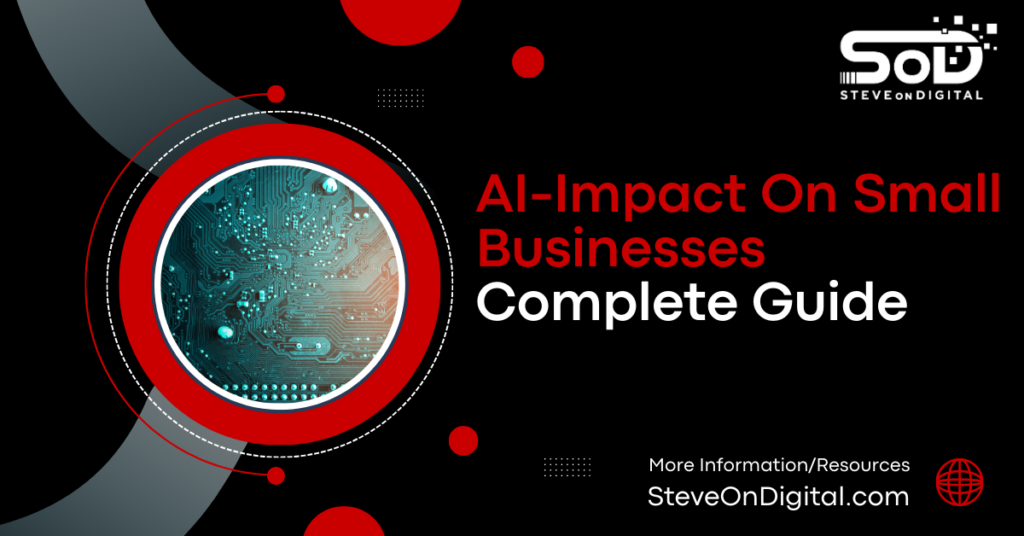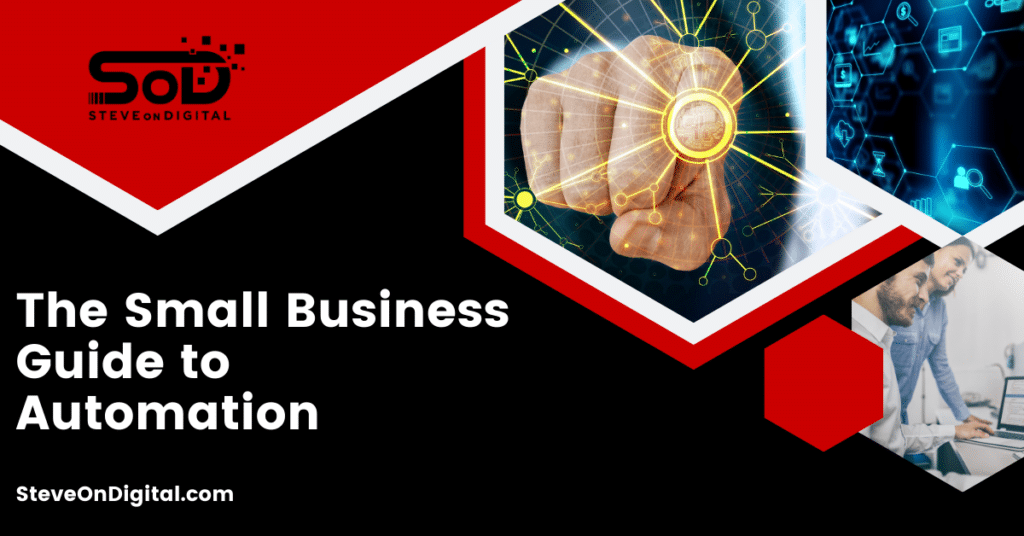AI – Impact On Small Businesses | Complete Guide

Hello, I’m Steve Johnston, the owner and author of SteveOnDigital, and today I want to explore the profound impact of AI on small businesses. As someone deeply entrenched in the digital transformation landscape, particularly for small and medium-sized enterprises (SMEs), I’ve witnessed firsthand how AI is reshaping the way we do business. Impact Of AI On Small Businesses Artificial Intelligence (AI) means machines that act smart like humans to do things and can get better by learning from what they see. AI encompasses a range of tools including machine learning, where computers can be trained to recognize patterns and make decisions based on data. The role of AI in modern business is expansive, influencing everything from data analysis to customer interactions and inventory management, with a variety of AI tools, including AI plug-ins and systems like ChatGPT, offering a spectrum of applications beneficial for small businesses. Overview Of AI Tools And Technologies For small businesses, AI technologies provide a competitive edge by offering valuable insights and automating repetitive tasks. Common AI tools that are particularly beneficial include virtual assistants for handling customer inquiries, chatbots for enhancing the customer experience, and analytical tools that help in recognizing patterns in vast amounts of data quickly. AI Tool Benefits for Small Businesses Virtual Assistants Handles customer inquiries efficiently, reducing wait times. Chatbots Enhances customer service by providing instant responses 24/7. Analytical Tools Quickly identifies patterns in large data sets for better decision-making. AI Plug-ins Integrates with existing software to improve functionality and automation. These tools are not just about technology—they represent a pivot towards more strategic, efficient operational models. The Growing Importance Of AI The adoption of AI by most small businesses has shown notable increases in efficiency and improvements in customer service. AI systems help businesses manage their resources more effectively, ensuring they can focus on growth and innovation. For instance, AI can analyze customer behavior patterns to provide personalized experiences, a crucial factor in building loyalty and satisfaction in today’s market. Implementing AI For Business Operations And Strategic Growth As we delve deeper into the applications of AI, it’s evident that small business owners can leverage this technology to dramatically enhance their operations and position themselves for significant growth. Efficiency And Productivity Enhancement Automation Of Repetitive Tasks Using AI Systems ‘One of the most immediate benefits of AI for small businesses is the automation of mundane, repetitive tasks. AI software can handle activities like scheduling, data entry, and even certain aspects of customer service, freeing up human employees to focus on more complex and creatively demanding tasks. This shift not only improves operational efficiency but also employee satisfaction. AI Application Task Automated Impact on Business Efficiency Automated Scheduling Systems Scheduling and data entry Reduces manual labor and error rates, increasing operational speed. AI Customer Service Platforms Handling routine inquiries Frees up staff for complex tasks, enhancing service quality. AI Financial Tools Generating financial reports Automates analysis, speeding up decision-making processes. AI In Inventory Management AI tools are particularly effective in inventory management, a critical area for many small businesses. AI systems can predict stock needs based on trend analysis, helping businesses maintain optimal stock levels and streamline order processing. This kind of efficiency in operations directly contributes to smoother business processes and reduced overhead costs. Implementing AI For Faster And More Accurate Data Analysis In the realm of data analysis, AI proves invaluable. AI technologies can process vast amounts of data from various sources to derive actionable insights swiftly. This capability allows small business owners to make informed decisions quickly, a decisive advantage in today’s fast-paced market environments. The Strategic Adoption Of AI Technology In the swiftly transforming landscape of modern commerce, artificial intelligence (AI) serves as a cornerstone for enabling small businesses to excel and adapt. By integrating AI tools such as machine learning algorithms and virtual assistants, these enterprises can greatly enhance customer interactions and inventory management, leading to remarkable improvements in operational efficiency. Such technologies are instrumental in allowing small business owners to analyze vast amounts of data quickly, offering valuable insights that drive business growth. AI systems also facilitate enhanced employee training, ensuring that workforce skills align with evolving technological demands. This strategic adoption of AI technology not only secures a competitive edge but also catalyzes sustained economic contributions by small businesses. Business Operation AI Application Expected Outcome Inventory Management Predictive stock needs analysis Optimized stock levels, reduced costs Customer Service Personalized customer interaction Increased customer loyalty and satisfaction Data Analysis Fast processing of large data sets Quick and informed decision-making Marketing Targeted campaigns and content creation Enhanced customer engagement and higher conversion rates Enhancing Customer Interactions And Experience Role Of AI In Managing Customer Inquiries Through Virtual Assistants AI-driven virtual assistants are revolutionizing the way small businesses handle customer inquiries. These AI tools efficiently manage large volumes of inquiries without human intervention, ensuring that customers receive timely and accurate responses. AI Feature Functionality Customer Benefit Personalized Marketing Analyzing customer data for preferences Tailors marketing messages, enhancing user engagement. Proactive Service Bots Predicting customer needs Addresses needs proactively, increasing satisfaction. Real-time Response Systems Handling inquiries instantaneously Improves response times dramatically, ensuring customer needs are met swiftly. My experience with AI in customer service highlights its ability to maintain high standards of customer interaction without significant resource expenditure. Personalizing The Customer Experience With AI-Driven Insights Further, AI’s ability to analyze customer interactions and feedback provides small businesses with the insights needed to tailor services and products to individual preferences. This personalization is crucial for enhancing the customer experience and building stronger relationships with clients. Utilizing AI Tools For Improved Customer Service And Engagement Lastly, AI technology fosters enhanced customer service by predicting customer needs and offering proactive solutions. For instance, AI can suggest additional purchases or remind customers about upcoming events, which enhances engagement and fosters a deeper connection between the business and its customers. AI’s Transformational Impact On Marketing And Sales As a digital transformation specialist, I have utilized AI extensively to refine marketing strategies and
The Small Business Guide To Automation | SteveOnDigital

Hey everyone, Steve Johnston here from SteveOnDigital. Today I will share my thoughts and experiences on how small businesses can use automation. This is based on real data and practices that will work for you. So let’s get started! The Small Business Guide to Automation What And Why? Business automation is using technology to do tasks or jobs in a business that people do by hand. This is key for small businesses because it speeds up by simplifying things and allows you to focus on strategic tasks that grow the business. Adding small business automation to your operations can simplify and automate more tasks, speed up productivity, and allow you to focus even more on innovation and growth. Small Business Operations Automation can speed up small business operations by automating tasks. Efficiency through automation allows small businesses to reduce time spent on admin tasks, reduce data entry errors, and speed up response to leads and customer inquiries. In today’s digital world being competitive means being able to act fast and automation gives you that power. Automation in small business operations is a key to unlocking new levels of efficiency, scalability and growth, and ultimately customer satisfaction. Where To Automate Manual Tasks To Automate In my experience running a digital transformation consultancy I’ve seen a pattern of tasks that small businesses can automate: Benefits Of Automating Boring Tasks The benefits are clear and measurable. For example, automating tasks can reduce operational costs by 20% (MarketSplash). It allows employees to focus on more important, more rewarding work which leads to higher job satisfaction and productivity. Automation in marketing has been shown to increase leads by up to 80% and conversion rates significantly (Paperform) (Workato). From personal experience implementing customer relationship management (CRM) systems has changed how my business interacts with clients. It simplified our processes, reduced the load on our team, and improved our customer engagement strategies. Small Business Automation Areas Customer Service For small businesses, customer service is a key battleground. Here’s how automation can help: Sales and Marketing Automation in sales and marketing saves time and makes sure no lead is left behind: Operations Operational efficiency is key to profitability in a small business: Area Tasks Suitable for Automation Tools Recommended Customer Service Ticketing, Chatbots Zendesk, Intercom Sales Lead management, Follow-ups HubSpot, Salesforce Marketing Social media posting, Email marketing Hootsuite, Mailchimp Choosing The Right Tools Automation Tool Overview When it comes to choosing automation tools there are many to choose from, each with features for different parts of the business: How To Choose Tools That Fit Your Business Needs And Budget Choosing the right tools can be tough but here’s how you can make it easier: Through my own experience of digitizing businesses, I have found that the right automation tools not only save time but also improve customer experience and operations. They have been instrumental in how we handle repetitive tasks, manage customer relationships, and push our marketing efforts while keeping a tight lid on labor costs and improving our service quality. Automation In Your Business How To Plan And Deploy Integration Strategies Training And Support For Usage Automation Of Business Processes Workflow Automation Workflow automation can improve service quality and operations. By automating key processes businesses can ensure tasks are done on time and with fewer errors and a better service delivery. CRM Implementing these systems will require an upfront investment but the long-term benefits of automation in saving time, reducing costs, and improving service quality are undeniable. Monitoring and Refining Automated Systems Tracking Progress and Team Productivity Implementing automation is just the beginning. Here’s how you can monitor and refine these systems: Data Analysis For Improvement Metric Method of Measurement Target Outcome Productivity Track output pre- and post-automation Increase by 30% Customer Engagement Monitor customer interaction metrics Improve response times by 50% ROI Calculate cost savings vs. initial investment Achieve break-even within 1 year Advanced Automation Strategies AI and Machine Learning As we look forward AI and machine learning is transforming automation from task execution to decision-making support. Automation Future By using these advanced technologies we can get more operational efficiency, better customer experiences, and drive our business forward. Building an Automation Framework Scalable Automation Solutions Solving Common Issues Automation and Business Growth ROI Case Studies I have seen this firsthand through my journey with SteveOnDigital how automation has changed the operations to be more efficient and responsive. For us automating the mundane tasks allowed the team to focus more on strategic goals and we saw significant growth in service quality and customer satisfaction. As we conclude this part of the guide, remember the goal of automation should be to improve your business processes to be more efficient and effective. Whether it’s through customer interactions, operational tasks or business performance insights automation can be a game changer for your growth. Future and Next-Gen Automation Emerging Automation Technologies and Their Impact Get Ready for Next-Gen Automation Conclusion Automation benefits small businesses: Small Business Owners As a fellow small business owner, I encourage you to think about how automation can fit into your business. It’s not about being relevant, it’s about being successful in a competitive world. Automation can give you the tools to improve your operations, understand your customers better, and drive growth. By adopting these technologies we can future-proof our businesses and face the challenges ahead. Let’s get started today with the tools to succeed. Remember the automation journey is ongoing and being agile is key to getting the most out of it for your business.

